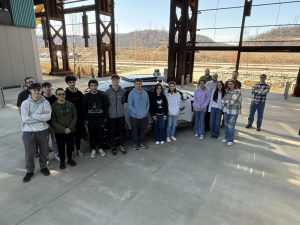Across the student body, high schoolers at Bethel Park all know what the PSSAs are about; these rigorous exams popped up every year throughout middle school and specifically for eleventh graders. However, this year is different for all high schoolers within the state of Pennsylvania, as the state has changed the curricula and has molded a different approach to standardized tests.
The Keystones are more subject based and chunked into narrow categories. On the other hand, the PSSAs explored a wide variety of subjects; for instance, the math portion detailed an array of mathematical courses such as geometry, probability and statistics, and algebra.
The state now mandates that all high schools administer the Keystone Exam. This exam explores high school Literature, Biology, and Algebra I. Similarly, at Bethel Park High School, the general populous have undergone pre-tests, rigorous tests online, exclusive Biology lessons by science teachers, evaluations, lessons in Algebra and basic Literature, and subject material in preparation for the newly ascribed standardized tests called the “Keystones.” The Keystones have been worked on diligently for the past couple of years by a cluster of teachers and administrative figures.
Pennsylvania Department of Education’s website shows the scores from 2011 when a total of 184,752 students were tested and the majority of students scored Basic in Biology, Algebra I, and Literature. However, the majority of students in 2011 scored either advanced or proficient in Math, Science, and Reading. Why is this?
The main reason is that the Keystones are new and students are adjusting to the format of the test, as well as the teachers. In the past years, the Keystones were first developing and the “makers” were refining and tweaking glitches with the format.
The main difference between the Keystones and PSSAs is that “the Keystones are content based. As opposed to a comprehensive approach,” Dr. Jansante states. For the most part, this is advantageous to students. Students can now prepare more efficiently and effectively since the state standardized tests are narrowed down by specific subjects; this is opposed to studying for a wide variety of subjects (PSSAs). This, nonetheless, gives teachers more flexibility in the way they prepare students for standardized tests, as teachers can review specific, focused material based content.
However, this raises a problem. The problem is that the Keystones are new to the teachers too, so how can they sufficiently prepare their students when they don’t even know what the tests look like? This problem was addressed and fixed when the administration purchased a seat on the website “usatestprep.org.” Moreover, before the students were assessed, students were to log into “USA Test Prep” to take a pretest to see where they stand.
“All the students took a baseline data pretest to see what areas they aren’t strong in, and work through the content based questions to sure up their shortcomings,” Dr. J says. The students took all three baseline tests so teachers could see where their students stand. Based on this information, teachers could then prepare warm-up questions for students to complete and review packet so students could revamp and sharpen their skills in each area.
Likewise, Dr. J states, “the Biology department had to align the classes with the core standard that the State implements.” This was accomplished when students from their regular science classes were asked to leave class and attend a biology class for three consecutive days to learn the “Big Ideas” and curriculum framework, as these are stated in Pennsylvania Department of Education’s Standard Aligned System. Undoubtedly, the administration was proactive with the situation as students received a well needed refresher in biology; conversely, some juniors haven’t taken biology since freshman year, which raises a dilemma.
Beginning with the class of 2017, the Commonwealth and administration will implement a legislation that all students must pass a certain percentage of the Keystones in order to graduate. Remember, the Keystones are developing and the Commonwealth’s board are making refinements to improve the test. Thus, by the time the class of 2017 takes the exam there will be a total of ten modules. As well, Dr. J notes, “Two more content areas will be assessed. In addition, the students will have to pass six of the ten modules (class of 2017).”
Remember, the Keystones are in the preliminary stage and anything new always has its glitches. The refinements will be addressed and made with time. “As we get acclimated to the exam, student performance will go up accordingly,” Dr. J notes. This will definitely be held true, as the Keystones being highly scrutinized under the microscope because of the state’s performance, basic level in 2011, opposed to the PSSA’s advanced and proficient performance in 2011.
* Please visit the embedded link below to explore PA’s new Standards, Assessment, and Curriculum Framework.
http://www.pdesas.org/












